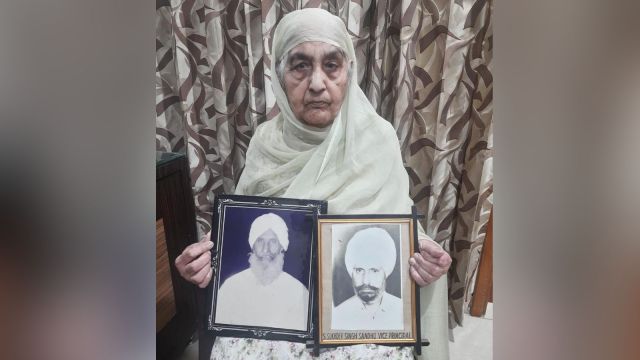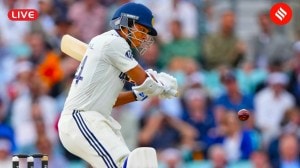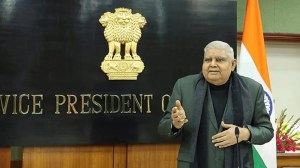Lost her freedom fighter father, lecturer husband, and son to police encounters, 82-year-old says she stayed alive to get justice
On Wednesday, CBI Special Judge Manjot Kaur convicted former Sarhali SHO Surinderpal Singh for kidnapping, illegal confinement, and criminal conspiracy to murder Sulakhan Singh and Sukhdev Singh.
 Sukhwant Kaur with pictures of her father Sulakhan Singh and husband Sukhdev Singh. (Express Photo)
Sukhwant Kaur with pictures of her father Sulakhan Singh and husband Sukhdev Singh. (Express Photo)On the day she was born, Sukhwant Kaur’s father, Sulakhan Singh, was in Lahore Jail as part of India’s freedom movement.
Eighty-two-year-old Sukhwant Kaur witnessed the partition of India and Pakistan as a child, surviving the bloodbath to reach newly created India with her father, later recognised as a freedom fighter. The family settled in Bhakna village, Amritsar, in 1947, where Kaur became the first student at a school started by Gadar Party founder Sohan Singh Bhakna, a close associate of her father.
Married to government lecturer Sukhdev Singh, Kaur lived a fulfilling life until tragedy struck in November 1992, when the police killed her father, husband, and son in staged encounters, denying her their bodies for last rites.
On October 31, 1992, Sulakhan Singh visited Kaur in Amritsar. The next morning, the police detained him and her husband at Sarhali police station under ASI Avtar Singh. Despite visits by family and teachers’ union members, their whereabouts became unknown after three days. Kaur sent telegrams and complaints to higher authorities, fearing foul play, but received no response.
Sukhdev Singh, then vice-principal of Government Senior Secondary School in Lopoke, Amritsar, was well-regarded. Even communist leaders Satpal and Vimla Dang, family friends, wrote to Punjab Chief Minister Beant Singh, who denied the men were in police custody.
In December 1992, the police claimed Kaur’s son, Baljinder Singh, was killed in an encounter but did not return his body.
 In 1995, the Supreme Court ordered a CBI probe into the mass cremation of unidentified bodies by Punjab Police, exposed by human rights activist Jaswant Singh Khalra, who was also killed in a fake encounter. (Express Photo)
In 1995, the Supreme Court ordered a CBI probe into the mass cremation of unidentified bodies by Punjab Police, exposed by human rights activist Jaswant Singh Khalra, who was also killed in a fake encounter. (Express Photo)
In 1995, the Supreme Court ordered a CBI probe into the mass cremation of unidentified bodies by Punjab Police, exposed by human rights activist Jaswant Singh Khalra, who was also killed in a fake encounter. Kaur gave her statement to the CBI in 1996, leading to a case in 1997 against then-Sarhali SHO Surinderpal Singh and ASI Avtar Singh for abduction and criminal conspiracy. The CBI’s closure report in 2000 was rejected by a Patiala court, prompting further investigation.
In 2003, police personnel obtained Kaur’s signature on blank papers and later issued a death certificate for Sukhdev Singh, falsely claiming he died of a heart attack on July 7, 1993. “It was verbally conveyed that his body and that of Sulakhan Singh were thrown into the Harike Canal after torture,” said Sarabjit Singh Verka, human rights activist.
In 2009, the CBI filed a chargesheet, and charges were framed in 2016. However, ASI Avtar Singh died during the trial.
On Wednesday, CBI Special Judge Manjot Kaur convicted former Sarhali SHO Surinderpal Singh for kidnapping, illegal confinement, and criminal conspiracy to murder Sulakhan Singh and Sukhdev Singh. Singh is already serving life imprisonment in the Jaswant Singh Khalra murder case and 10 years in another case involving disappearances.
“I was bedridden in 2021 and didn’t expect to survive. I asked my family to request an early judgment. Somehow, I lived to hear it,” said Kaur. “This is a relief, though justice for killing a freedom fighter and his son-in-law is impossible. I still seek justice for my son, but perhaps it’s not meant for this life.”
Under National Human Rights Commission orders, Kaur received compensation for her son’s killing.












